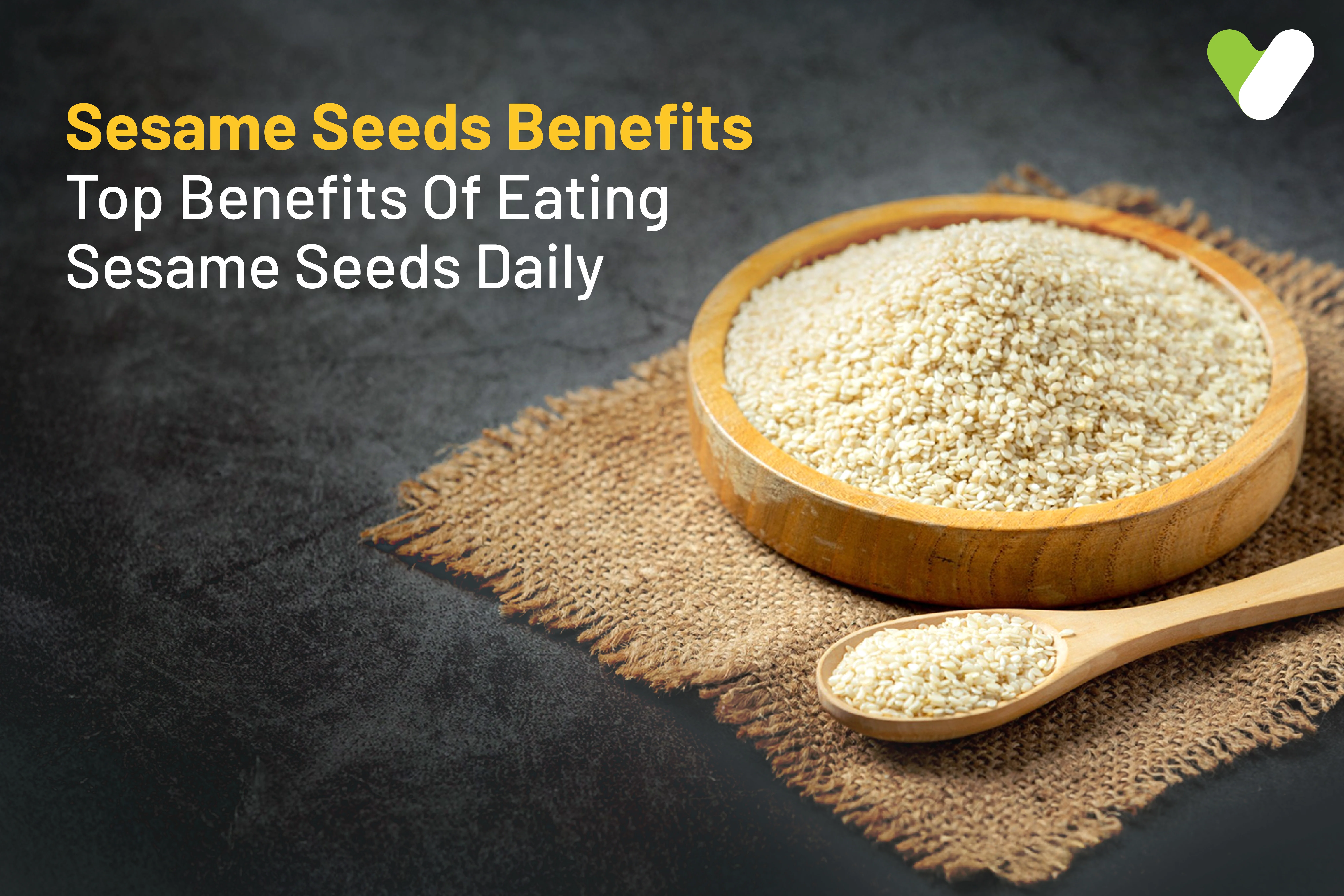For worship, for flavor or for overall health benefits. Sesame seeds are a powerhouse of minerals, vitamins and fibre. The list of sesame seeds benefits will convince you. Consuming these tiny seeds that are available in black and white color help to strengthen your bones, and also relieves inflammation. Apart from these, sesame seeds are good for regulating cholesterol levels, blood sugar levels, and blood pressure levels too.
In this article, we will acquaint you with sesame seeds uses along with white sesame seeds benefits.
Sesame Seeds Nutrition
Before digging deeper to understand sesame seeds health benefits, we want you to have a look at the nutritional value of sesame seeds in every 100 grams:- Calories- 573
- Carbohydrates – 23 g
- Protein- 18 g
- Dietary Fibre- 12 g
- Sugar – 0.3 g
10 Incredible Health Benefits of Sesame Seeds
Here is a list of amazing sesame benefits for your reference:1. High Fibre Content
Being an ultimate source of fibre, sesame seeds are good for your digestion. Add about 2 to 3 tablespoons of these tiny seeds to your diet and can expect a great relief in your stomach-related problems like constipation, bloating, and acid reflux.2. Good for Bone Health
Sesame seeds in the hulled and unhulled form are good for your bones. They are a superfood rich in calcium, the main compound needed for healthy bones. Get the most of the calcium content out of these seeds by soaking, sprouting, or roasting them before use.3. Regulates Cholesterol and Triglycerides Levels
Eating sesame seeds in any form and color, helps to reduce bad cholesterol or LDL levels in the body. Besides, these seeds are found extremely powerful in reducing triglycerides levels in the body.4. Lower Blood Pressure
Rely on the power of sesame seeds to lower your high blood pressure. These seeds though small in size are high in the potential to regulate your blood pressure issues due to the lignans and Vitamin E content.5. Controls Blood Sugar Levels
Do include sesame seeds in your diet if you are a diabetic. These seeds are high in protein and other nutrients and low in carbs. All this helps in controlling the blood sugar levels in the body.6. Relieves Thyroid Symptoms
One of the most unknown sesame seeds benefits is that eating sesame seeds daily helps in improving thyroids functions. Being a rich source of selenium these white and black seeds help in producing thyroid hormones in the body.7. Heals Arthritis Knee Pain
Are you suffering from arthritis? Then sesame seeds are like superfood for you and you must leverage the sesame benefits. Due to their anti-inflammatory properties sesame seeds help in relieving arthritis knee pain. Arthritis is caused by inflammation and oxidative damage and sesame combats both.8. Combats Inflammation
The list of benefits of sesame seeds doesn’t end here. These tiny seeds are effective in combating inflammation in the body. Inflammation whether you know it or not is responsible for several chronic conditions like kidney diseases, cancers and obesity. So, eating sesame means reducing the risk of all such diseases.9. Aids in Blood Cell Formation
Those who make sesame seeds a part of their daily diet can increase blood cell formation. Having 2 to 3 tablespoons of these seeds helps to increase the production of red blood cells and white blood cells.10. Hormonal Balance for Females During Menopause
Sesame seeds benefits for females are many. Sesame seeds are very nutritious and good for women. They strengthen bones due to high levels of calcium, magnesium and zinc. The lignans in them help balance hormones which can alleviate PMS symptoms. Their fiber content helps in weight management and fulness. Sesame seeds improve skin health, provides iron for energy, supports heart health by lowering cholesterol and digestive health by preventing constipation.Women after menopause tend to suffer health issues due to a drop in estrogen levels. Eating sesame seeds that are rich in phytoestrogens helps to balance the hormonal changes in females during menopause.
Side Effects of Sesame Seeds
After going through the list of benefits of eating sesame seeds, it is time to also look at some of the sesame seeds side effects. Mentioned below are some side effects of eating sesame seeds excessively:- May drop blood pressure levels
- May form a layer over the appendix leading to bloating, pain, and other stomach related issues
- May drop blood glucose levels in the body


